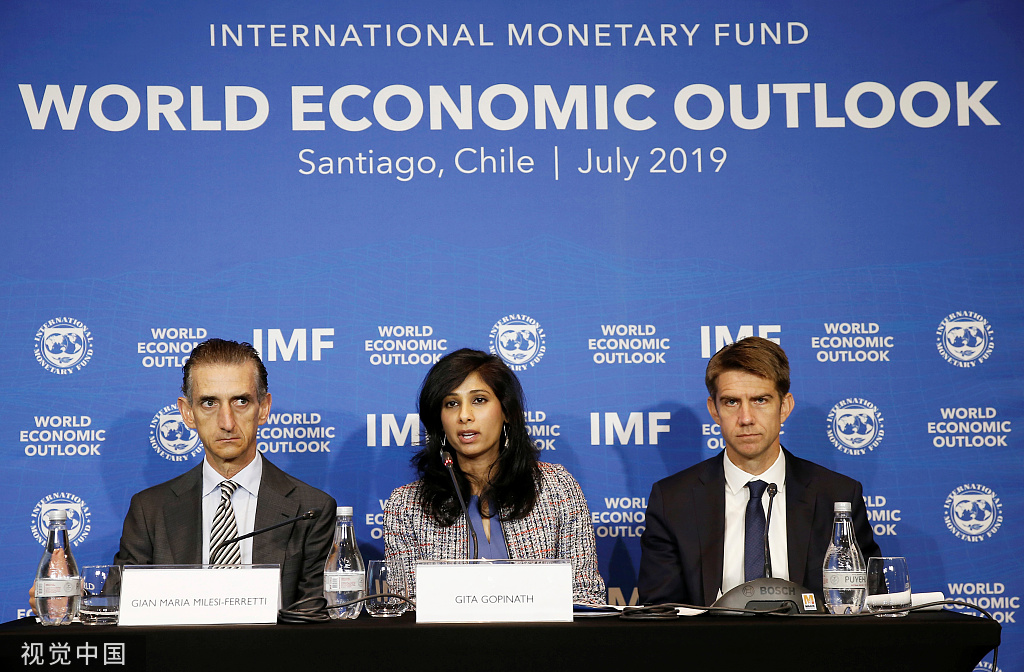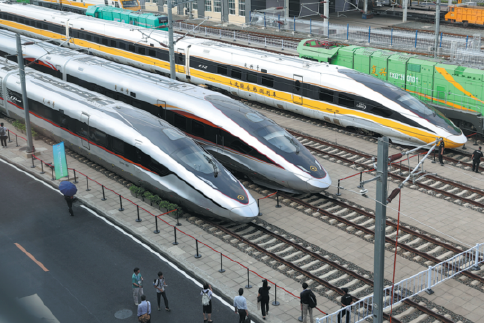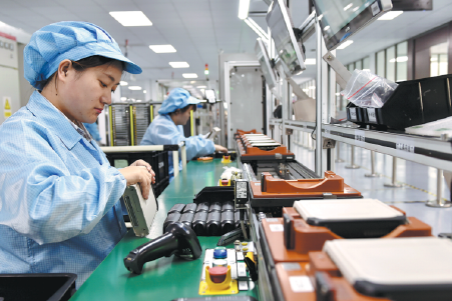IMF warns of 'self-inflicted' growth curbs


Countries should not use tariffs to target bilateral trade imbalances or as a substitute for dialogue in pressing for reforms, the International Monetary Fund said on Tuesday amid reports that US officials will travel to China to resume trade talks.
In its World Economic Outlook (WEO) update, the IMF revised downward its projection for global growth to 3.2 percent in 2019, and 3.5 percent in 2020.
Albeit only 0.1 percentage point lower for both years than in the IMF's April forecast, it comes after previous significant downward revisions, the lending organization said on Tuesday.
"Global growth is sluggish and precarious, but it does not have to be this way, because some of this is self-inflicted," said IMF chief economist Gita Gopinath.
"Dynamism in the global economy is being weighed down by prolonged policy uncertainty as trade tensions remain heightened despite the recent US-China trade truce; technology tensions have erupted threatening global technology supply chains, and the prospects of a no-deal Brexit have increased," she said at a news conference.
The downward revisions for 2019 are almost across the board for the major economies, though for varied reasons. In China, the slight revision downward reflects, in part, the higher tariffs imposed by the United States in May, she said at the briefing in Santiago, Chile, according to transcripts provided by the IMF.
In the US, 2019 growth is expected to be 2.6 percent, 0.3 percentage point higher than in the April WEO, but will moderate to 1.9 percent in 2020, as fiscal stimulus unwinds, according to the WEO update.
With global growth subdued and downside risks dominating the outlook, the global economy remains at a delicate juncture.
"It is therefore essential that tariffs are not used to target bilateral trade balances or as a general-purpose tool to tackle international disagreements," she said.
The combined effect of tariffs imposed last year and potential tariffs envisaged in May between the US and China could reduce the level of global GDP in 2020 by 0.5 percent, the economist said.
Gopinath said that "with trade tensions we would hope that both the US and China would find a way to quickly resolve their tensions, and at the same time, that both countries also work towards improving the rules-based multilateral trading system".
De-escalating tariffs and removing all additional tariffs the US and China have levied on each other's imports since early last year has been a major topic for China-US trade talks.
On Tuesday, US media reported that US Trade Representative Robert Lighthizer and Treasury Secretary Steven Mnuchin will travel to Shanghai for face-to-face trade talks with Chinese officials.
While Bloomberg said they would travel to China on Monday, CNBC reported that would happen sometime between Friday — the start of a six-week congressional recess in Washington — and Thursday, Aug 1.
Lighthizer's office hadn't confirmed the report by Tuesday evening.
White House economic adviser Larry Kudlow called it a good sign that top US officials would be traveling to China to restart talks, and the US stock market rallied Tuesday partly in reaction to the reports, which investors believed lifted hopes of a trade agreement.
If held as reported, the meetings in Shanghai would be the first since trade talks between the world's top two economies stalled in May, and after the leaders of the two countries met on the sidelines of the G20 summit in Japan last month, where they pledged to resume negotiations and avoided further increases in tariffs.
Cheng Li, director of the John L. Thornton China Center of the Brookings Institution, said it is better for the two sides to resume the dialogue following their recent two rounds of phone talks.
While previous rounds of high-level trade negotiations all took place either in Beijing or Washington, Shanghai is a venue that is "less political", according to Li.
He said he agreed that if the two sides were to reach an agreement, all the tariffs added since the trade dispute started early last year must be removed.
China has made it clear that it wants an equal trade agreement that must address the country's core concerns, such as lifting all additional tariffs, making trade procurement figures realistic, and that the text of any deal must be "balanced".




































